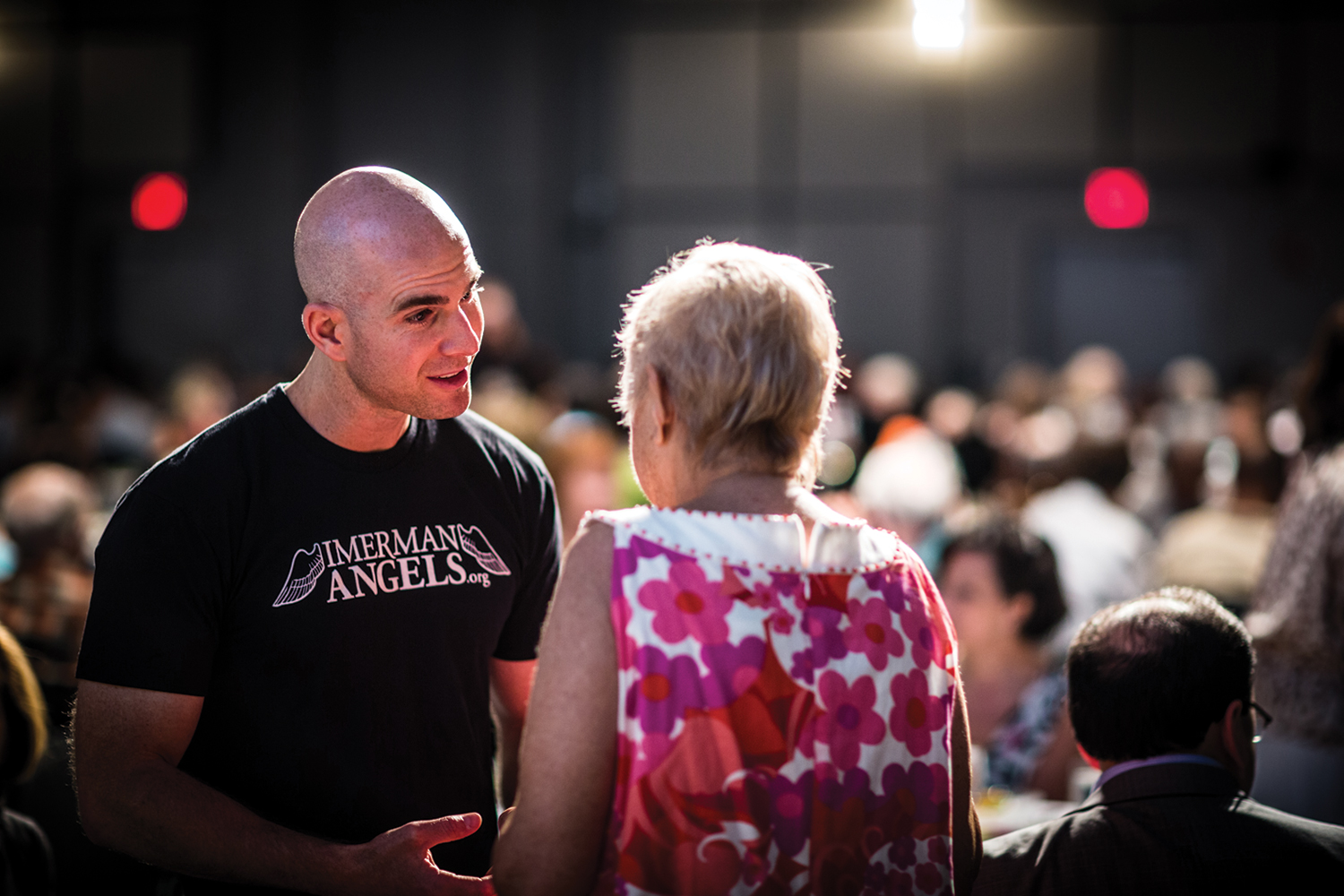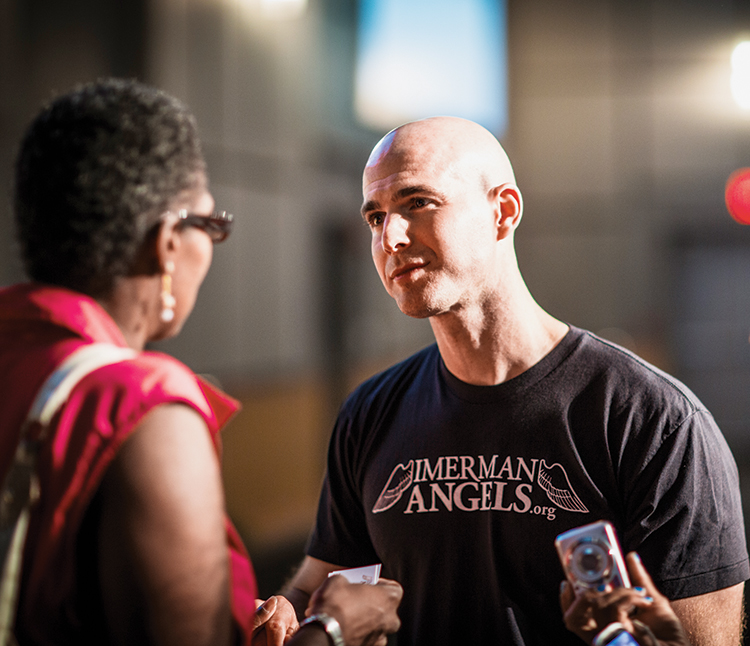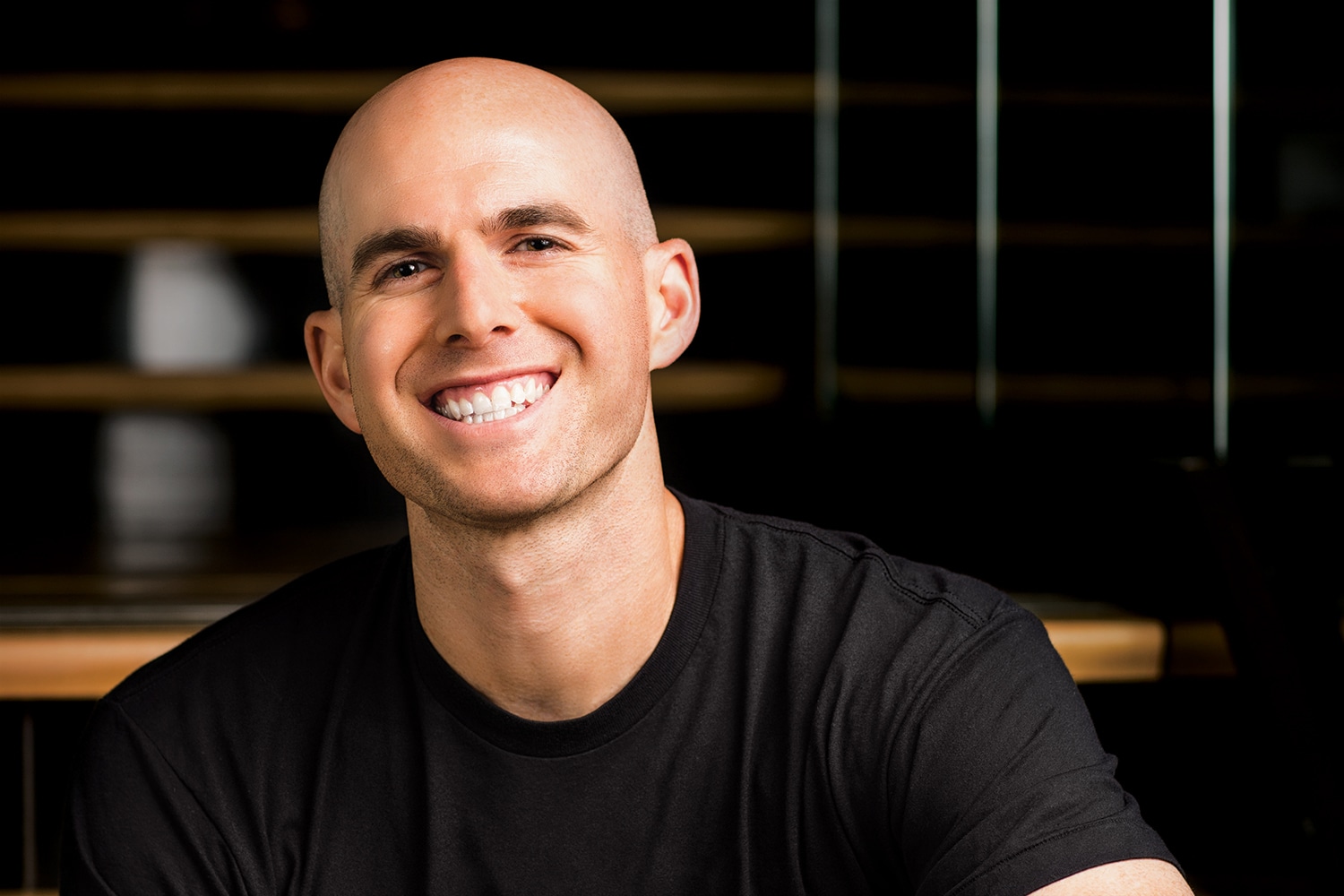GAVIN ROBERTSON DIDN’T KNOW MUCH ABOUT ETHAN ZOHN before he made that first phone call three years ago. The commercial real estate broker from Boise, Idaho, had no idea Zohn was the 2002 celebrity winner of Survivor: Africa or a cofounder of the nonprofit Grassroot Soccer, which promotes HIV/AIDS education and prevention in Africa. But Robertson, a 13-year cancer survivor, did know this: He and Zohn, who lived in New York City, were both in their 30s, active, in serious relationships, and diagnosed with lymphoma—and Zohn needed his help.
It took a special brand of matchmaking to introduce Zohn to Robertson: Imerman Angels. A Chicago-based nonprofit founded in 2003 by testicular cancer survivor Jonny Imerman, the group links cancer survivors as mentors to individuals newly diagnosed with cancer and in treatment; it links caregivers, too. Imerman has a natural flair for connecting people, and the matches made by his organization now number more than 8,000, spanning every state in the United States and more than 65 countries.
Over the past nine years, Imerman has developed a vast network of cancer survivors representing nearly every type of the disease, and his goal is to pair every cancer “fighter”—as Imerman Angels calls someone in active treatment—with a survivor within 24 hours of contacting his organization.
Filling a Need
Imerman was working toward an M.B.A. when he was diagnosed in 2001. He didn’t know any other young people with cancer, much less testicular cancer.
“No one could look me in the eye and say, ‘[I’ve] been there: This is what you should know. This is your survivor information kit,’ ” says Imerman, 37.
His left testicle was surgically removed, but doctors soon found the cancer had spread. Imerman banked sperm in case he wanted to have children one day and began chemotherapy involving prolonged cycles of BEP—Blenoxane (bleomycin), Vepesid (etoposide) and Platinol (cisplatin)—over five months because of side effects and delays. The side effects included everything from mouth sores and cystic acne to partial hearing loss and a blood clot in his left arm. He gained 40 pounds, lost his eyelashes, and his skin became bleached to the point where he says he felt like an “alien.” Nearly one year after chemotherapy, as he struggled to adapt to his post-cancer identity, a routine CT scan showed four tumors along his spine. All were successfully removed.
As tough as his treatment was, Imerman knew on some level he was fortunate. He had a loving mother and brother, and close friends. But he saw many other patients, alone in their hospital rooms, who had no one to discuss concerns about side effects, pain or ways to navigate the medical system, much less their deeper fears and anxieties. As Imerman recovered, he began to visit them and share his story: “Hey, what’s up, I’m Jonny. What’s your name? I have testicular cancer. What type of cancer do you have?”
The other patients were happy to talk, even though it was clear to him that a 20-something single guy with testicular cancer probably wasn’t the best support for a 60-year-old woman with ovarian cancer. He began compiling a database of his new friends’ profiles in his spare time and to recruit any willing to mentor other patients. Suddenly, he was a matchmaker.
It was a matter of filling a crack in the system, he explains. His mother inspired the group’s eventual name when she referred to his survivor buddies as “angels.”
“I was lucky that the lessons taught to me [as a child growing up] were about kindness,” he says. “I was taught [to find] meaning and purpose in everything: If you see something and you see a way to help other people, do something about it. For me, it was really clear. I didn’t want to brush [my cancer] under the rug and pretend it didn’t happen.”
A Matchmaking Mission
In 2006, Imerman’s part-time matchmaking became a full-time job. By then, he had moved to Chicago from his home state of Michigan and was running his nonprofit round-the-clock from a 400-square-foot studio apartment where he still lives. The following year, the organization moved out of his home and into an office in the city’s artsy River North neighborhood, where it now has five full-time staff members—four of whom have had cancer—and a revenue goal for 2012 of $650,000, up from $500,000 in 2010. The primary source of revenue is the Chicago Marathon (133 runners raised $130,000 last year), followed by fundraising events and individual donations.
Imerman, who earns $72,000 a year and says he prefers personal interactions to Excel spreadsheets, considers himself the “chief mission officer.”
“I’m not a CEO kind of guy,” he says. “The part I want to do is to make sure all the dots are connected.”

Finding the “perfect friend for a person at the perfect time” is what makes an effective match, says Jonny Imerman, the energetic matchmaker behind Imerman Angels. Photo by David Lewinski.
He likes to keep things simple: He’s a vegan. He doesn’t drink alcohol. He shaves his head and has a wardrobe consisting primarily of 50 black Imerman Angels T-shirts. At the office, he greets visitors with hugs rather than handshakes and wears cargo shorts, white athletic socks without shoes, and colored wrist bands for cancer charities. Those include Lance Armstrong’s Livestrong Foundation, which has helped fund Imerman Angels under a formal partnership and sent more than 1,000 “angels” to the group last year.
John May helped Imerman start the organization and serves as chairman of its board of directors. He says Imerman—who is one of his best friends—is focused, honest and devoted to his cause and his friends at the expense of a personal life. (That’s improving, says Imerman, who was recently preparing to go on dates with two different women in one week.) “Any tough times I’ve ever had, I can call him, and he will make time,” says May.
Inspiration and Friendship
The message from Imerman Angels is consistently upbeat—“A Mentor Angel is walking, talking, living proof and inspiration that cancer can be beaten”—and some might say overly optimistic. The death rate from all cancers combined is continuing to decline—a trend that began in the early 1990s. However, cancer remains the second most common cause of death in the U.S., according to the American Cancer Society, with 571,990 people expected to die of the disease this year.

In June 2012, Jonny Imerman spoke to 600 patients, caregivers and medical professionals at the Henry Ford Hospital in Detroit. “It was ALL LOVE and BIG HUGS and ALL good energy!” he wrote in an email afterward. Photo by David Lewinski.
Imerman knows that not everyone is able to “beat” the disease, and some mentors are matched with “thrivers,” as Imerman Angels call those who have terminal conditions. All mentors, once they’re screened by staff, are encouraged to share their personal experiences but trained not to cross the line between offering support and giving medical advice, Imerman says. The organization does not review medical records.
Steven Rosen, the director of Northwestern University’s Robert H. Lurie Comprehensive Cancer Center in Chicago, has been a member of Imerman’s board of directors since 2010. He says any initial concerns he had about the program’s ability to recruit volunteers who understood and respected the line between providing support and offering medical advice were allayed because of the group’s extensive volunteer selection process and vigilant follow-up. Most individuals diagnosed with cancer, he notes, are interested in knowing the side effects of therapy and what to expect in the short- and long-term. “It’s very normal for an individual diagnosed with cancer to be frightened, to be apprehensive about what may lie ahead,” says Rosen. “There is great comfort in speaking to someone who has gone through a similar experience.”
What makes an effective match, Imerman says, is finding the “perfect friend for a person at the perfect time,” taking specifics of the disease into consideration as well as age, gender, sexual orientation, religion, geography and parenthood, among other factors. Robertson and Zohn’s match is but one example. “I have a great support network, but nobody really knew what … I was going through,” says Zohn, who has undergone two stem cell transplants. Robertson “really was my co-pilot through this entire journey and still is to this day.”
Matches vary. One woman in rural Indiana was matched with another who happened to live in a nearby subdivision. A woman in France found Imerman Angels’ website and was matched to a survivor in the U.S.; they communicated via Skype. Some mentors find their “fighter” has dozens of questions for them in the first conversation. Some talk every day and meet once a week. Some speak only once, asking for financial advice, for instance, and then never talk again. Others become close friends.
For Benji Salter, 31, an anesthesiologist in New York City, having a mentor made him feel more prepared and hopeful about what lay ahead. Salter was diagnosed with stage II Hodgkin lymphoma in 2007, which required six months of chemotherapy every other week. His mentor told him “things that nobody else could help me with,” he says.
Salter found his mentor’s perspective so useful that he went on to become a mentor himself. “People think it’s helpful for just the person receiving the information,” he says, “but to me, and a lot of people I talk to, it’s very cathartic for the survivor.”
Fired Up
To those who know him, Imerman is the energetic motor that makes his organization hum, and virtually everyone agrees that he seems unstoppable. Even his computer messages jump off the screen, punctuated by “GREAT,” “AMAZING,” and “SO glad you each CRUSHED your cancers! keep well!! :)” and “TOGETHER we are strong!!”
Angie Henderson, a 33-year-old Chicago special education teacher with stage IV cervical cancer, feels fortunate to have him in her life. “The way he writes his emails and texts, I don’t even need to talk to him to get his positive energy,” Henderson says. “They make me smile. They make me laugh. I look to him to have those moments.”
Imerman says he could talk about cancer all day long, and every day is different. He’ll visit people at Northwestern Memorial Hospital, have lunch with a nonprofit peer, then host a fundraiser. The next day, he’ll speak at a school and travel across the country to appear at a medical center or cancer organization benefit to spread the word about Imerman Angels’ mission to connect people diagnosed with cancer. It’s a far cry from how his life was before his diagnosis, when his daily outfit was a suit and tie and his goal was to succeed in the business world. Cancer, he says, “has given me so much more than it’s taken from me.”
Cancer Today magazine is free to cancer patients, survivors and caregivers who live in the U.S. Subscribe here to receive four issues per year.





